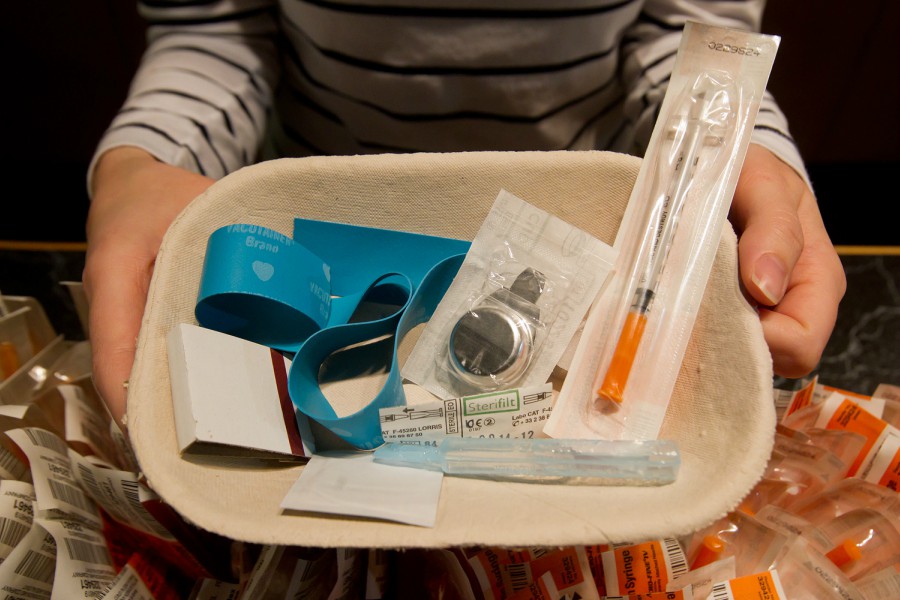Philly Just Announced Plans for the Nation’s First Safe Injection Site
Officials say opening a facility where people can use drugs under medical supervision could save 76 lives a year.

A registered nurse holds a tray of supplies to be used by a drug addict at the Insite safe injection clinic in Vancouver, B.C., on Wednesday May 11, 2011. (AP File Photo/The Canadian Press, Darryl Dyck)
It’s official: Philly is embracing plans to open the nation’s first safe injection site.
At a press conference on Tuesday, officials detailed the grim effects of Philly’s opioid crisis and said launching a safe injection site – where people can take drugs under medical supervision – should be considered as part of a larger effort to fight harm.
They’re encouraging what they call CUES, or Comprehensive User Engagement Sites, which they say would be financed through private donors. CUES would offer people experiencing addiction “essential” services in a walk-in setting, including referral to treatment, wound care, medically supervised drug consumption, and access to sterile injection equipment and naloxone. They would ultimately work to “reduce substance use, the harms associated with substance use, and fatal overdose,” the city says.
Officials say it’s a radical but necessary step in fighting the opioid epidemic in Philly, where the situation is dire: The city’s overdose rate is greater than in any other big city in the U.S., and officials expect that roughly 1,200 people died from drug overdoses in Philly in 2017 – which is four times the city’s murder rate.
“We cannot just watch as our children, our parents, our brothers, and our sisters die of drug overdose,” Philly health commissioner Thomas Farley said in a statement. “We have to use every proven tool we can to save their lives until they recover from the grip of addiction.”
Philly’s fatal overdose rate is worst in the nation among large cities. I applaud Opioid Task Force and City leadership's actions to encourage private-sector development of Comprehensive User Engagement Sites (CUES). This bold action will help save lives. https://t.co/7UUnwLjIEI
— Mayor Cherelle L. Parker (@PhillyMayor) January 23, 2018
The city has been actively considering safe injection sites for more than a year. At the recommendation of the Mayor’s Task Force to Combat the Opioid Epidemic, officials visited Vancouver, which opened North America’s first safe injection site in 2003, last year.
Eva Gladstein, deputy managing director of Health and Human Services, said the visits to Vancouver – as well as Seattle, where similar efforts are underway – “really hit home that establishing CUES is just one piece of the puzzle to address the opioid crisis.”
“Our efforts to prevent addiction, help people access treatment, prevent overdoses in other ways, increase housing resources and address public safety concerns are already under way and must continue to grow and strengthen,” she added.
The city conducted a scientific review of supervised injection sites, which shows that some facilities have not only reduced deaths from drug overdose but also prevented HIV, hepatitis C, and other infections. According to the report, one site in Philly could prevent up to 76 deaths from drug overdose each year.
It’s important to note that the city will not own or operate a safe injection site, as opposed to other cities with facilities, like Vancouver, but officials are asking organizations like community nonprofits or medical organizations to operate and fund sites. Overall, planning is in a very early stage, and costs and potential locations for a site have not been announced. Kensington, an epicenter of the opioid epidemic, will likely be considered.
#PHLOpioids pic.twitter.com/tm75l7qlzz
— Philadelphia Public Health (@PHLPublicHealth) January 23, 2018
The CUES faces several potential roadblocks — the largest of which will likely be the federal government. Attorney General Jeff Sessions is notoriously tough on even low-level drug offenders. Neither the U.S. Department of Justice nor the local U.S. Attorney’s Office has commented specifically on safe injection sites – but federal officials elsewhere have warned locales considering sites, like Vermont, that maintaining sites where illicit drugs are used is a crime.
At the press conference on Tuesday, deputy managing director Brian Abernathy reportedly said that “realistically, [the city is] not going to be able to protect [the site] from federal prosecution.”
“But we’re confident and hopeful the federal government has more important things to do than not save people’s lives,” he added.
If Philly can successfully open a safe injection site, it will be the first U.S. city to do so. Several other cities, like Seattle and Ithaca, N.Y., are also looking to open similar facilities.
Needless to say, the sites are controversial. Proponents point to evidence that they save lives, connect drug users to treatment they wouldn’t otherwise receive, and work to decriminalize addiction and reframe the opioid crisis as a public-health issue. Opponents stress that safe injection sites could normalize dangerous behavior and illegal drug use. For more information on safe injection sites, check out our short guide.


